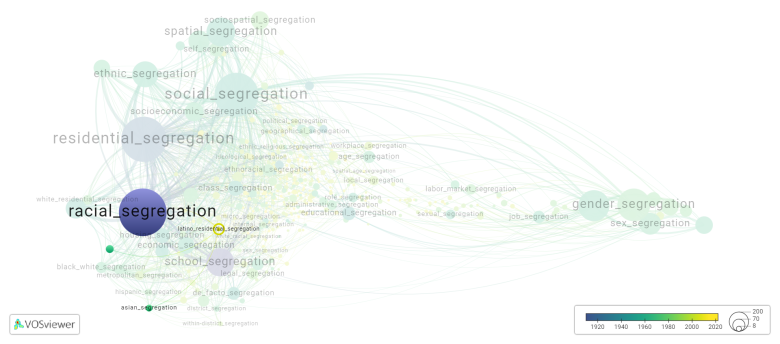Latino residential segregation: Difference between revisions
(Creating page) |
(Creating page) |
||
| (One intermediate revision by the same user not shown) | |||
| Line 12: | Line 12: | ||
[[File:latino_residential_segregation.png|780x780px]] | [[File:latino_residential_segregation.png|780x780px]] | ||
This visualization is based on the study [[Segregation_Wiki:About| The Multidisciplinary Landscape of Segregation Research]]. | |||
For the complete network of | For the complete network of interrelated segregation forms, please refer to: | ||
* | * [https://tinyurl.com/2235lkhw First year of publication] | ||
* | * [https://tinyurl.com/2d8wg5n3 Louvain clusters] | ||
* | * [https://tinyurl.com/223udk5r Betweenness centrality] | ||
* | * [https://tinyurl.com/244d8unz Disciplines in which segregation forms first emerged (Scopus database).] | ||
==References== | ==References== | ||
==Notes== | ==Notes== | ||
Latest revision as of 07:17, 16 October 2024
Date and country of first publication[1][edit | edit source]
2016
United States
Definition[edit | edit source]
Latino residential segregation refers to the spatial separation of Latino populations from other racial or ethnic groups within a community or city. This segregation can result from various factors, including economic inequality, discrimination, historic patterns of settlement, and social and cultural preferences. It can manifest in the form of Latino-majority neighborhoods or entire communities that are predominantly Latino, with limited interaction or integration with other racial or ethnic groups. This segregation can have negative impacts on educational opportunities, economic mobility, health outcomes, and overall quality of life for Latino residents. Efforts to address Latino residential segregation often involve policies and initiatives aimed at promoting diversity, inclusivity, and equal access to resources and opportunities across different neighborhoods and communities.
See also[edit | edit source]
Related segregation forms[edit | edit source]
Latino residential segregation is frequently discussed in the literature with the following segregation forms:
racial segregation, social segregation, latino white segregation, metropolitan residential segregation, residential segregation, ethnic residential segregation, black residential segregation

This visualization is based on the study The Multidisciplinary Landscape of Segregation Research.
For the complete network of interrelated segregation forms, please refer to:
References[edit | edit source]
Notes[edit | edit source]
- ↑ Date and country of first publication as informed by the Scopus database (December 2023).
At its current state, this definition has been generated by a Large Language Model (LLM) so far without review by an independent researcher or a member of the curating team of segregation experts that keep the Segregation Wiki online. While we strive for accuracy, we cannot guarantee its reliability, completeness and timeliness. Please use this content with caution and verify information as needed. Also, feel free to improve on the definition as you see fit, including the use of references and other informational resources. We value your input in enhancing the quality and accuracy of the definitions of segregation forms collectively offered in the Segregation Wiki ©.
Latino residential segregation appears in the following literature[edit | edit source]
Plascak J.J., Molina Y., Wu-Georges S., Idris A., Thompson B. (2016). Latino residential segregation and self rated health among Latinos: Washington State Behavioral Risk Factor Surveillance System, 2012 2014. Social Science and Medicine, 159(), 38-47. Elsevier Ltd.https://doi.org/10.1016/j.socscimed.2016.04.035
Crowell A.R., Fossett M. (2018). White and Latino Locational Attainments: Assessing the Role of Race and Resources in U.S. Metropolitan Residential Segregation. Sociology of Race and Ethnicity, 4(4), 491-507. SAGE Publications Inc..https://doi.org/10.1177/2332649217748426
Schachter A., Sharp G., Kimbro R.T. (202). (Can’t Get No) Neighborhood Satisfaction? How Multilevel Immigration Factors Shape Latinos’ Neighborhood Attitudes. Socius, 6(), -. SAGE Publications Inc..https://doi.org/10.1177/2378023120921634
Anderson K.F., Simburger D. (2022). Racial/Ethnic Residential Segregation, Poor Self rated Health, and the Moderating Role of Immigration. Race and Social Problems, 14(2), 131-149. Springer.https://doi.org/10.1007/s12552-021-09345-0
